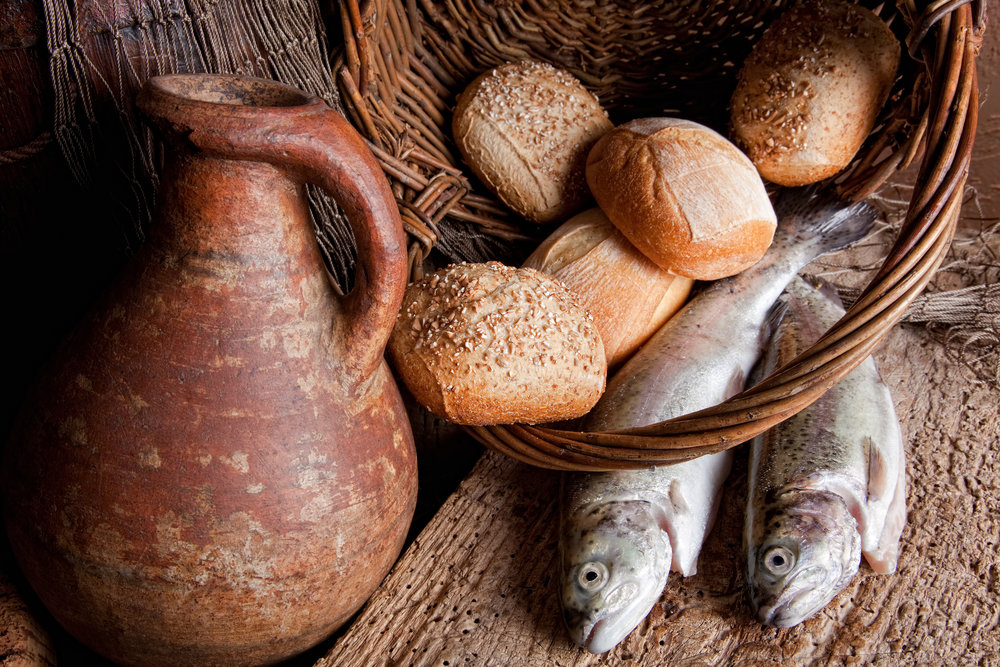Ninth Sunday after Pentecost, Gospel Year A
Hope Is Our Food
Matthew 14:13–21
Ninth Sunday after Pentecost
Analysis by Nathan Hall
13 Now when Jesus heard this, he withdrew from there in a boat to a deserted place by himself. But when the crowds heard it, they followed him on foot from the towns. 14 When he went ashore, he saw a great crowd; and he had compassion for them and cured their sick. 15 When it was evening, the disciples came to him and said, “This is a deserted place, and the hour is now late; send the crowds away so that they may go into the villages and buy food for themselves.” 16 Jesus said to them, “They need not go away; you give them something to eat.” 17 They replied, “We have nothing here but five loaves and two fish.” 18 And he said, “Bring them here to me.” 19 Then he ordered the crowds to sit down on the grass. Taking the five loaves and the two fish, he looked up to heaven, and blessed and broke the loaves, and gave them to the disciples, and the disciples gave them to the crowds. 20 And all ate and were filled; and they took up what was left over of the broken pieces, twelve baskets full. 21 And those who ate were about five thousand men, besides women and children.
DIAGNOSIS: Deprivation
Step 1: Initial Diagnosis (External Problem): Wilderness Starvation
We are at a time of particular turmoil in our country. Black lives are clamoring for justice. Asylum seekers, even children, are detained in prison. Unknown federal law enforcement personnel are snatching citizens from the streets and driving them off in unmarked vans. The backdrop of this turmoil is a pandemic that tempts us to make mask-wearing a political statement. The world has turned upside-down. We may not recognize where we are anymore, but it’s definitely some kind of wilderness.
Step 2: Advanced Diagnosis (Internal Problem): Not Enough
The disciples feared that there was not enough food to go around for the crowd gathered in the wilderness. If they shared with everyone what was available to them, they might get less than they needed or wanted. We likewise have good reason to fear scarcity. The stakes are high, the forces at play powerful, and we are being tossed to and fro. We are hungry for justice, for safety, for peace—for ourselves, and for others. But our dread that there might not be enough to go around overwhelms our courage.
Step 3: Final Diagnosis (Eternal Problem): Despair
What hope do we have? After many gut-wrenching hours swiping through our social media feeds, we have not seen much cause for hope. Divisions increase. Memes plant the seeds of irrational bias. Resigned, depressed, left without hope, or otherwise spiritually impoverished.
In our secular society, where do we look for deliverance? We look to our government, our courts, our church’s leadership. But no person or institution can be granted universal moral authority. All such authorities have been systematically eliminated. No one can feed the hunger that consumes us. No one can save us.
PROGNOSIS: Endowed
Step 4: Initial Prognosis (Eternal Solution): Jesus Is/Gives Food for Life
The Christian is found by hope. In the wilderness, the disciples saw absolutely no earthly possibility of feeding the multitudes. That didn’t stop Jesus. Today we disciples may look around and believe that we are out of earthly possibilities, except that God has inhabited the stuff of this earth. God has come to us in bread and wine. God has claimed us at baptism. God has promised that no devil, no ruler, no mob, no injustice, nothing in all creation will separate us from this love (Romans 8:39). And to prove the point Jesus inhabits the same flesh as us, offering himself with bread and wine: “This is my body/blood given for you for the forgiveness of sins.” Jesus becomes a child of earth, and lifts up earthly elements, reminding us that by God’s goodness we are richly fed.
Step 5: Advanced Prognosis (Internal Solution): It Is Enough
Like the disciples, we will never have or be enough by ourselves. But Jesus is enough for us. That does not mean we withdraw from the world in pietistic purity or impious fear. Instead, sustained by Jesus and his promises, we return to the fray with hope where worldly wisdom suggests there is no cause for hope. Yes, the stakes are high, but Jesus has already defeated the worst enemy, death. All things are possible for God.
Step 6: Final Prognosis (External Solution): Food Distribution
Jesus invites us to share the food with which we have been fed: We share the hope that is in us. Hope is not only the food that satisfies us, it summons love for others out of us. It’s not a command: “you must share this goodness or else!” But bubbles up in fits of joy, as God uses us as little Christs to feed our neighbors.
